Do not hesitage to give us a call, connect on Whatsapp or send us an email. We are happy to talk to you at any time.
+977 9851019279
info@asianheritagetreks.com
Damodar Kunda is situated north of the shadow-high Himalaya of Annapurna and east of Upper Mustang Lo-Manthang at a height of 5400 meters. According to the myth, God Shiva and Goddess Parvati left some parts of garments in Damodar Kunda. It is believed that if people took a bath in Damodar Kunda during the Damodar Kunda Yatra, they could wash away their sins. In the 2nd column of BarahPuran, Lord Kna says that whoever pays a visit to this Kunda and takes a deep bath will be freed from all sin. It is also mentioned in Puran that two sons of Kubers were suffering from their wrongdoing and sin, which they committed at their previous birth. Still, Lord Krishna suggested they take a bath in this kunda, and immediately after taking a bath in this kunda, they were released from all their sin.
Damodar Kunda has religious significance and is very important for all Hindus and Buddhists. Hindus and Buddhists believe it is not complete without visiting this lake before dying. Damodar Kunda Trek is an entirely restricted area, so an Upper Mustang restricted permit (RAP), Annapurna Area Permit (ACAP), and Trekking Information Management System (TIMS) with a licensed trekking guide are required for the trip.
In the morning, you will start your day with a 25-minute flight from Pokhara to Jomsom. The early part of the flight to Jomsom is extremely breathtaking. Under clear weather conditions, one can witness the Annapurna (8,091 m), the Dhaulagiri (8,167 m), and many more radiant peaks peeking out from the clouds. After landing in Jomsom, you can have your breakfast and begin your trek, heading to Kagbeni and following the Kali Gandaki River. The trail is rough and barren, but mostly flat. You will enjoy lovely views of mountains such as Dhaulagiri and Annapurna.
Kagbeni, a mediaeval-looking town that lies on the banks of two rivers, is an interesting windswept village that is situated on the main age-old Trans Himalayan salt trade route to Tibet via the Upper Mustang area. The Mustang district has the oldest monastery, which houses secrets that have yet to be unveiled.
Accommodation: an overnight stay in an available local lodge in Jomsom.
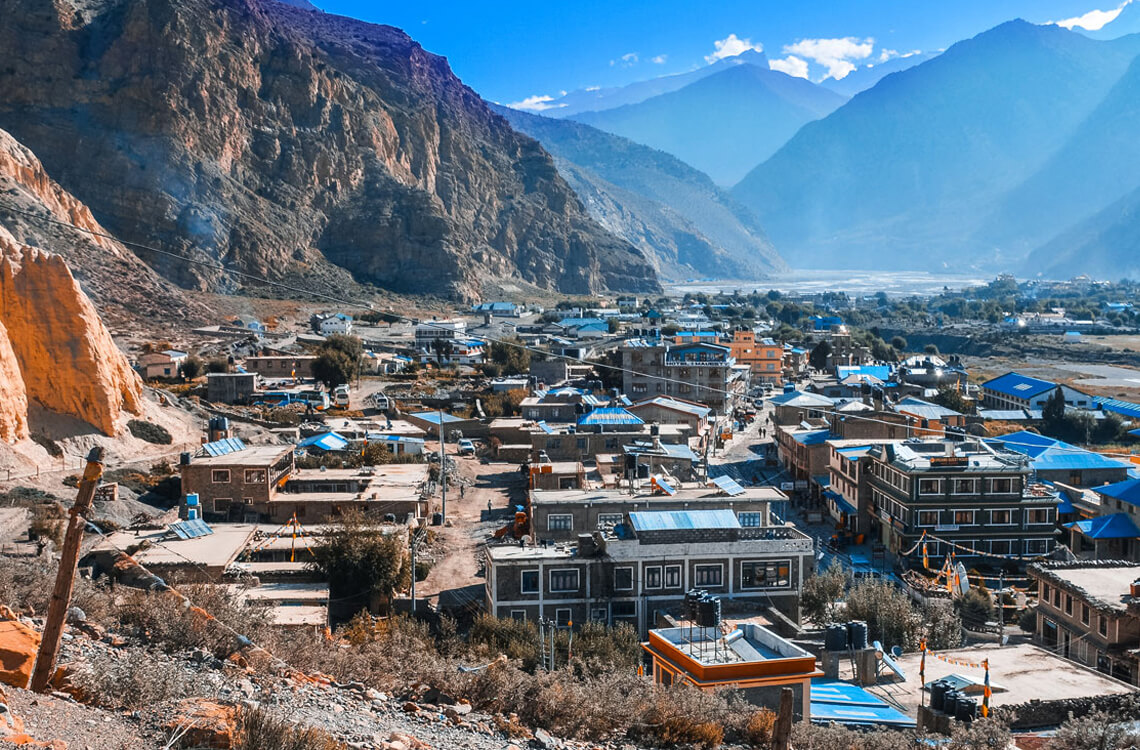
Today, you will commence your trek from Kagbeni. After walking for some time, you will see the caves on the west-hand side and the Gompa Kang. You will have a good climb to Tangebe (3,060 m), a labyrinth of narrow alleyways; here you will find the typical Mustang chortens painted in black, white, and red colors. Now, Chuksang is just an hour’s walk from here. The value of Chuksang has increased because of the presence of its three separate parts and ruined castle walls on the nearby cliffs, which is the centre of attraction for the people arriving in this place.
Accommodation: an overnight stay in an available local lodge in Chuksang.

With the dream of reaching the extremely new world near the Nepal-Tibetan border, you will start trekking from Chuksang to the beautiful place of Syangbochen via Chelle. You will pass through the summer pass on the way. Now you will find two walking paths: the upper path leads to Syangbochen via Vena, and the lower path leads to Milarepa cave. The more adventurous path will be the lower one, as you will find the herds of Himalayan transportation, i.e., ponies, horses, and donkeys carrying heavy loads on their backs, which are supported by ropes on their bodies. You will reach Syangbochen by walking for the whole day. Syangbochen is a tiny Tibetan-style village with some small shops and houses.
Accommodation: an overnight stay in an available local lodge in Syangboche.

In the early morning, you can have a beautiful view of Dhaulagiri (8,167 m) standing with other surrounding mountains from Syangbochen. After having breakfast, you will start walking from Dhakmar to the beautiful village, i.e., Ghami, passing Syangmochen Pass at 3,850 m altitude. You will have a lunch break in Ghami followed by a short sightseeing tour of the local monastery, people, cultures, and traditions. From Ghami, you continue walking to Dhakmar. Dhakmar is a Himalayan village with a different landscape. The place is surrounded by red, muddy rocks all around, with the Buddhist prayer flags fluttering due to the gushing wind.
Accommodation: an overnight stay in an available local lodge in Dhakmar.

Today, after breakfast, your trekking starts at Lo-Manthang. On the way, you have to walk through Dhakmar’s pass. The pass is magnificent, as there are natural rocks that look like frozen ice, and the architecture was made by human beings. From the pass, you will reach the Ghar Monastery, which has a red colour, which stands for its 1200-year-old historical importance. After lunch in Ghar, you will continue your trekking to Lo-Manthang. Lo Manthang was formerly the walled capital of the Lo Kingdom. Lo is culturally and linguistically Tibetan in the in the northern two-thirds of Mustang District. The homeland of Thakali people, who speak a different language and have a synthesis of Tibetan and Nepalese culture.
The village is known for its tall whitewashed mud-brick walls, gompas, and the King’s Palace, nine-cornered, five-story structures built around 1400. There are four major temples: Jampa Lhakhang or Jampa Gompa, the oldest, built in the early 15th century and also known as the “God house”; Thubchen Gompa, a huge, red assembly hall and gompa built in the late 15th century and located just southwest of Jampa Gompa; Chodey Gompa, now the main city gompa; and the Choprang Gompa, which is popularly known as the “New Gompa.” The presence of the architecture in the almost treeless barren landscape, which together presents a colourful mosaic made principally of earthen reds, yellows, and browns, has increased the value of this destination.
Accommodation: an overnight stay in an available local lodge in Lo-Manthang.
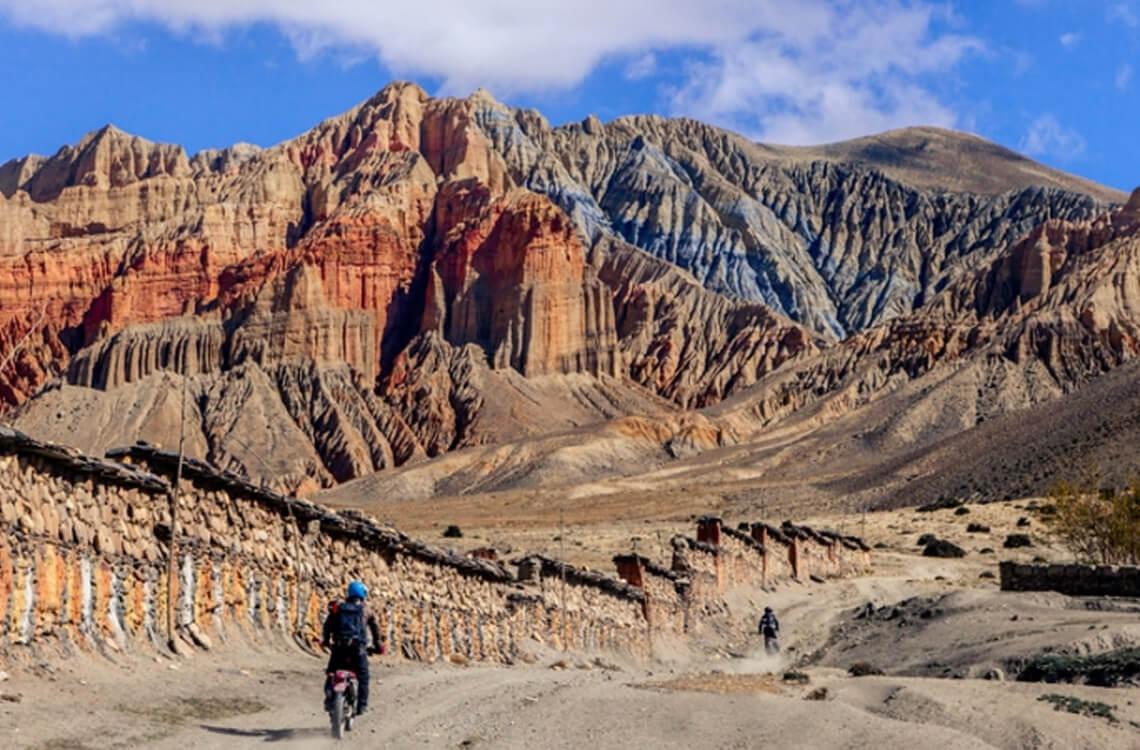
Today is your sightseeing day in and around Lo-Manthang. The city contains about 150 houses, as well as residences for many lamas. You will start your day at Zhong Cave and Tshosher Monastery (a 1000-year-old Tibetan monastery) by hiring either a horse or a Jeep. After returning from these places to Lo-Manthang, you will start the local sightseeing, which includes the King’s Palace, Monastery, local surroundings, and the village. The king’s palace is an imposing building in the centre of the city and is occupied by the current king and queen. Although his duties are largely ceremonial, the king is respected by the people. Throughout the kingdom, the villagers continue to seek his advice regarding many issues.
Accommodation: an overnight stay in an available local lodge in Lo-Manthang.

After enjoying a locally available breakfast, you will leave the beautiful Lo-Manthang and begin your journey to Yara. The trail steadily climbs two small passes before descending through a spectacular canyon to Dhi village, where you will have lunch. Afterward, you will continue walking along the riverbed until you reach Yara.
Accommodation: an overnight stay in an available local lodge in Yara.

Today, after having a locally available breakfast, your trekking starts in Baskhola. The environment of Baskhola is very panoramic, with sandy, brown-coloured rocks. This place is today’s destination. Our staff will manage tents for the overnight stays, and the chef will cook Nepali food for you and the other staff.
Accommodation: an overnight stay in a camp in Baskhola.
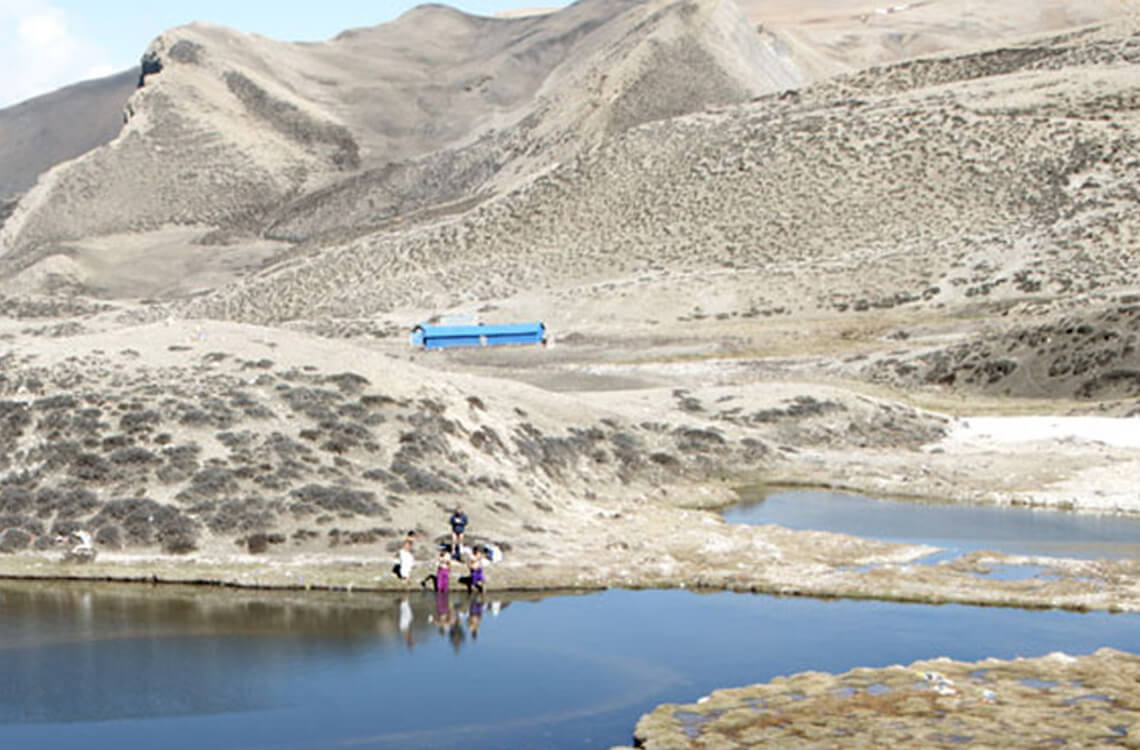
You will have breakfast prepared by our cook, and you will continue your trekking to the sacred place “Damodar Kunda.” Damodar Kunda is located in the remote Himalayan district in the lap of the high Himalayas of Upper Mustang in western Nepal. In the column of BarahPuran, Lord Krishna has said that whoever pays a visit to this Kunda and takes a deep bath will be freed from all sin.
It is also mentioned in Puran that two sons of Kubers were suffering from their wrongdoing and sin, which they committed at their previous birth. Still, Lord Krishna suggested they take a bath in this kunda, and immediately after taking a bath in this kunda, they were released from all their sin. A common name for the three lakes, Brahma Kunda, Rudra Kunda, and Ananta Kunda, is Damodar Kunda. There is also a large meadow of kasha. As the motherland of Saligram, this shrine is of utmost importance for all Hindus on earth; the Gandaki River is believed to originate from this holy lake.
Accommodation: an overnight stay in an available local lodge in Damodar Kunda.
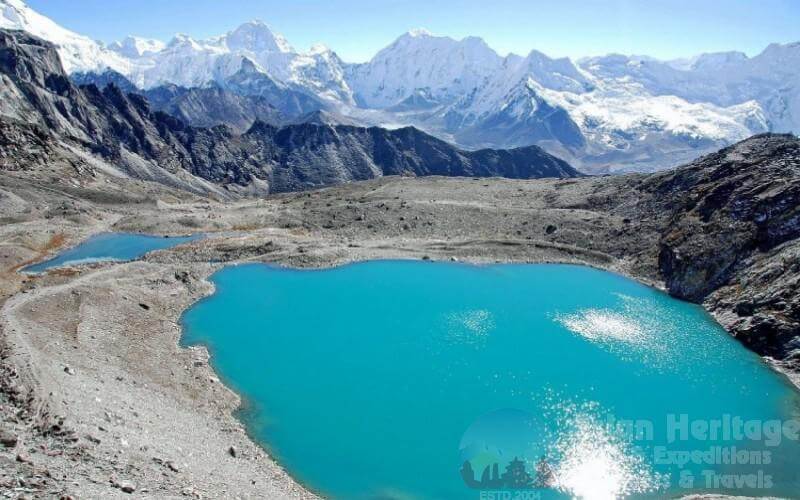
After having breakfast in the camp, you will go for local sightseeing and to view the panoramic beauty of the lake. Return to the camp, have your lunch, and start trekking down to Baskhola. Today is your last camping date.
Accommodation: an overnight stay in a tent camp in Baskhola.

After having your breakfast, today your trekking starts for Yara. The environment of Yara is very panoramic, with sandy, brown-coloured rocks. This place is today’s destination. Our staff will manage tents for the overnight stays, and the cook will cook Nepali food for you and the other staff.
Accommodation: an overnight stay in an available local lodge in Yara.
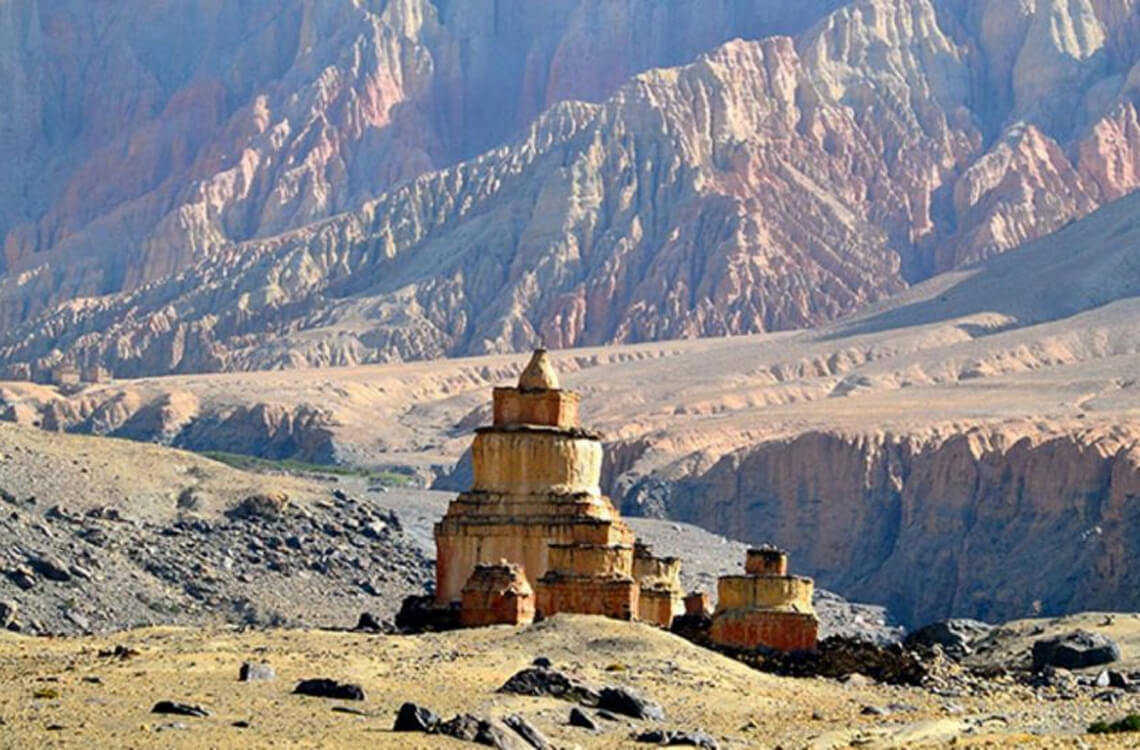
Leaving the beautiful Yara, you will start walking for Tyange. You will walk on a long plateau before descending to a river crossing and climbing up to a pass at 3860 m. After that, you have to walk, ascend, and then descend before meeting another plateau to reach the Tyange Village. This village is outstanding for its chortens alignment.
Accommodation: an overnight stay in an available local lodge in Tyange.
While trekking from Tyange to Chhusang. You will start walking down to a river crossing and then climbing up to a pass at 4,100 m named Pa. The views on the north are increasingly fantastic as the panorama unfolds between Tsarang, Lo, and the northern border. Finally, the summit of the pass is reached at 4050 m. To the south is the first stunning view of Dhaulagiri. Prayer flags adorn the pass. Half an hour from the pass is the only water source in this section, known by the locals as Ba Ha. After some rest, you will continue walking.
The trail opens out, and to the south, one can see the impressive V-shaped Kali Gandaki valley as it cuts between the Annapurnas, Nilgiri, and Dhaulagiri. From here, a spectacular descent begins, and after that, the path flattens out on a plateau and splints in two. The right fork leads to Chuksang, whereas the left one leads to Tetang. You will choose the right one and reach Chhusang.
Accommodation: an overnight stay in an available local lodge in Chhusang.
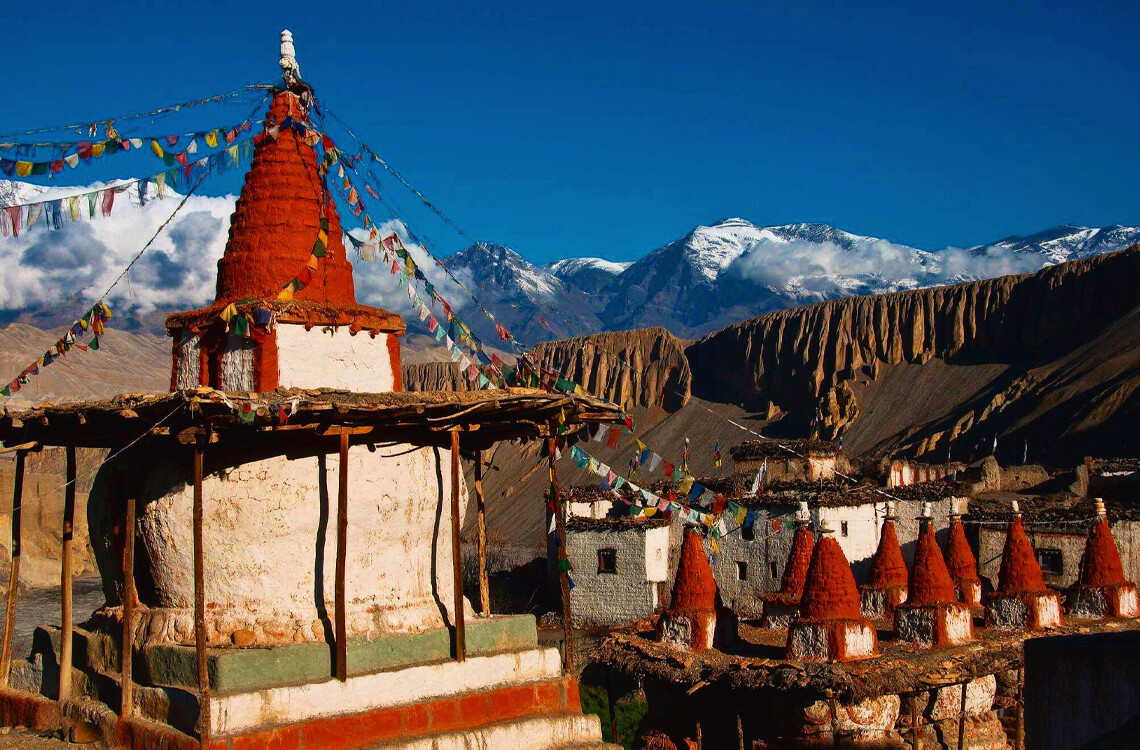
The trail goes up the Narsingchu to the nice village of Tetang. The village is divided into two parts. The walls of the outer houses are over 10 metres high with few windows, giving them a fortress-like appearance. The nearby second part of the village has the remains of a fort, again with high fortress-like walls. The trail heads up, across a plateau area, and turns east into a narrow river valley, eventually reaching a pass at 4030 m with superb views of the Dhaulagiri and Annapurna ranges. Then we go down to Jhong and cross the Jhong River before climbing up to Muktinath. After ascending for some hours, we reach Muktinath.
Accommodation: an overnight stay in an available local lodge in Muktinath.

In the morning, you will have a sightseeing tour of the very famous Hindu temple of Muktinath, where lots of pilgrims come to worship the god. You will start descending towards Jomsom to catch the flight to Pokhara the next morning.
Accommodation: an overnight stay in an available local lodge in Jomsom.

You will have an early breakfast in the lodge, and you will head towards the airport to catch the flight to Pokhara, a lake paradise city. It will take about 30 minutes to reach Pokhara. During the flight, you can see many mountains as well as the trail down to Tatopani/Ghorepani. Check in at the hotel in Pokhara. You have a full day to stroll around the city of Pokhara. You can enjoy roaming around the lakeside as well as having fun by boating in the Phewa Lake and witnessing the view and shadow of Annapurna, Machhapuchhre, and Dhaulagiri Mountains on the water of the Phewa Lake.
Accommodation: an overnight stay in the Batika Classic Hotel or a similar one.
